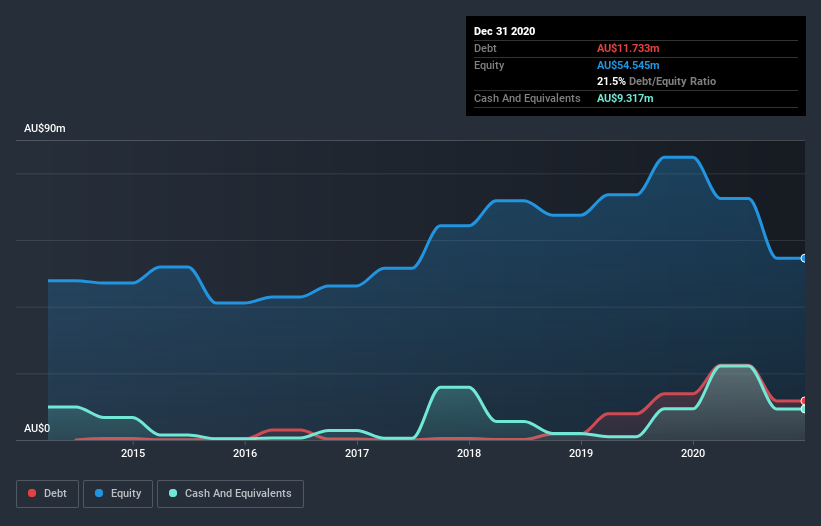Warren Buffett famously said, 'Volatility is far from synonymous with risk.' So it might be obvious that you need to consider debt, when you think about how risky any given stock is, because too much debt can sink a company. Importantly, Clean Seas Seafood Limited (ASX:CSS) does carry debt. But the more important question is: how much risk is that debt creating?
When Is Debt A Problem?
Debt assists a business until the business has trouble paying it off, either with new capital or with free cash flow. Part and parcel of capitalism is the process of 'creative destruction' where failed businesses are mercilessly liquidated by their bankers. However, a more frequent (but still costly) occurrence is where a company must issue shares at bargain-basement prices, permanently diluting shareholders, just to shore up its balance sheet. Of course, debt can be an important tool in businesses, particularly capital heavy businesses. The first thing to do when considering how much debt a business uses is to look at its cash and debt together.
View our latest analysis for Clean Seas Seafood
What Is Clean Seas Seafood's Debt?
You can click the graphic below for the historical numbers, but it shows that Clean Seas Seafood had AU$11.7m of debt in December 2020, down from AU$13.8m, one year before. However, it does have AU$9.32m in cash offsetting this, leading to net debt of about AU$2.42m.

A Look At Clean Seas Seafood's Liabilities
According to the last reported balance sheet, Clean Seas Seafood had liabilities of AU$14.7m due within 12 months, and liabilities of AU$12.3m due beyond 12 months. On the other hand, it had cash of AU$9.32m and AU$5.60m worth of receivables due within a year. So it has liabilities totalling AU$12.1m more than its cash and near-term receivables, combined.
Of course, Clean Seas Seafood has a market capitalization of AU$80.2m, so these liabilities are probably manageable. But there are sufficient liabilities that we would certainly recommend shareholders continue to monitor the balance sheet, going forward. There's no doubt that we learn most about debt from the balance sheet. But you can't view debt in total isolation; since Clean Seas Seafood will need earnings to service that debt. So when considering debt, it's definitely worth looking at the earnings trend. Click here for an interactive snapshot.
Over 12 months, Clean Seas Seafood made a loss at the EBIT level, and saw its revenue drop to AU$38m, which is a fall of 22%. That makes us nervous, to say the least.
Caveat Emptor
While Clean Seas Seafood's falling revenue is about as heartwarming as a wet blanket, arguably its earnings before interest and tax (EBIT) loss is even less appealing. Indeed, it lost a very considerable AU$39m at the EBIT level. When we look at that and recall the liabilities on its balance sheet, relative to cash, it seems unwise to us for the company to have any debt. So we think its balance sheet is a little strained, though not beyond repair. However, it doesn't help that it burned through AU$3.7m of cash over the last year. So suffice it to say we do consider the stock to be risky. When analysing debt levels, the balance sheet is the obvious place to start. But ultimately, every company can contain risks that exist outside of the balance sheet. Be aware that Clean Seas Seafood is showing 3 warning signs in our investment analysis , and 1 of those can't be ignored...
Of course, if you're the type of investor who prefers buying stocks without the burden of debt, then don't hesitate to discover our exclusive list of net cash growth stocks, today.
If you decide to trade Clean Seas Seafood, use the lowest-cost* platform that is rated #1 Overall by Barron’s, Interactive Brokers. Trade stocks, options, futures, forex, bonds and funds on 135 markets, all from a single integrated account. Promoted
New: AI Stock Screener & Alerts
Our new AI Stock Screener scans the market every day to uncover opportunities.
• Dividend Powerhouses (3%+ Yield)
• Undervalued Small Caps with Insider Buying
• High growth Tech and AI Companies
Or build your own from over 50 metrics.
This article by Simply Wall St is general in nature. It does not constitute a recommendation to buy or sell any stock, and does not take account of your objectives, or your financial situation. We aim to bring you long-term focused analysis driven by fundamental data. Note that our analysis may not factor in the latest price-sensitive company announcements or qualitative material. Simply Wall St has no position in any stocks mentioned.
*Interactive Brokers Rated Lowest Cost Broker by StockBrokers.com Annual Online Review 2020
Have feedback on this article? Concerned about the content? Get in touch with us directly. Alternatively, email editorial-team (at) simplywallst.com.
About ASX:CSS
Clean Seas Seafood
Operates in the aquaculture industry in Australia, Europe, North America, Asia, and internationally.
Mediocre balance sheet low.
Similar Companies
Market Insights
Community Narratives




